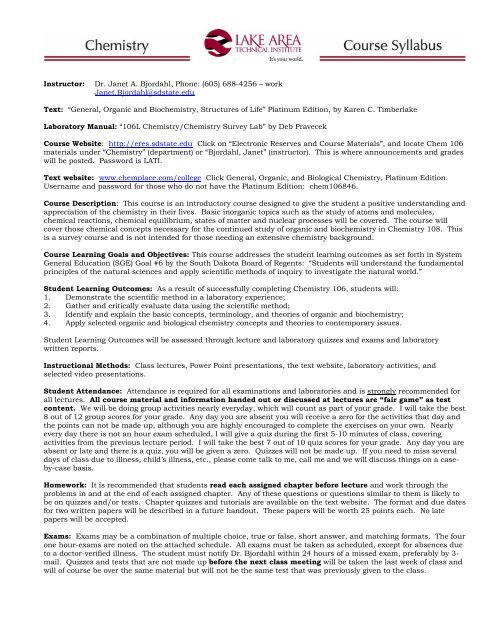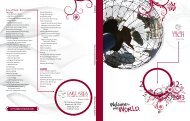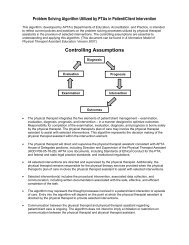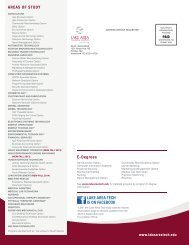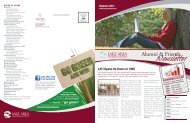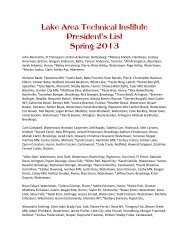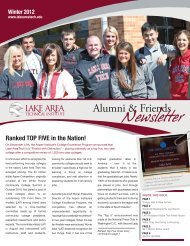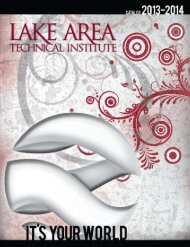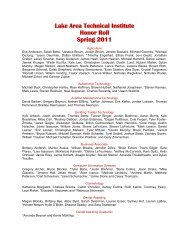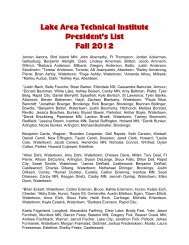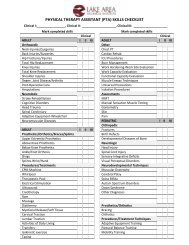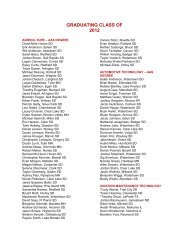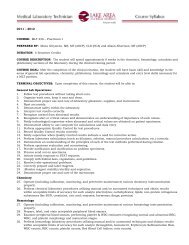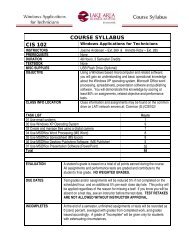Chemistry 108 Organic and Biochemistry, 5 Credits - Lake Area ...
Chemistry 108 Organic and Biochemistry, 5 Credits - Lake Area ...
Chemistry 108 Organic and Biochemistry, 5 Credits - Lake Area ...
Create successful ePaper yourself
Turn your PDF publications into a flip-book with our unique Google optimized e-Paper software.
Instructor:<br />
Dr. Janet A. Bjordahl, Phone: (605) 688-4256 – work<br />
Janet.Bjordahl@sdstate.edu<br />
Text: “General, <strong>Organic</strong> <strong>and</strong> <strong>Biochemistry</strong>, Structures of Life” Platinum Edition, by Karen C. Timberlake<br />
Laboratory Manual: “106L <strong>Chemistry</strong>/<strong>Chemistry</strong> Survey Lab” by Deb Pravecek<br />
Course Website: http://eres.sdstate.edu Click on “Electronic Reserves <strong>and</strong> Course Materials”, <strong>and</strong> locate Chem 106<br />
materials under “<strong>Chemistry</strong>” (department) or “Bjordahl, Janet” (instructor). This is where announcements <strong>and</strong> grades<br />
will be posted. Password is LATI.<br />
Text website: www.chemplace.com/college Click General, <strong>Organic</strong>, <strong>and</strong> Biological <strong>Chemistry</strong>, Platinum Edition.<br />
Username <strong>and</strong> password for those who do not have the Platinum Edition: chem106846.<br />
Course Description: This course is an introductory course designed to give the student a positive underst<strong>and</strong>ing <strong>and</strong><br />
appreciation of the chemistry in their lives. Basic inorganic topics such as the study of atoms <strong>and</strong> molecules,<br />
chemical reactions, chemical equilibrium, states of matter <strong>and</strong> nuclear processes will be covered. The course will<br />
cover those chemical concepts necessary for the continued study of organic <strong>and</strong> biochemistry in <strong>Chemistry</strong> <strong>108</strong>. This<br />
is a survey course <strong>and</strong> is not intended for those needing an extensive chemistry background.<br />
Course Learning Goals <strong>and</strong> Objectives: This course addresses the student learning outcomes as set forth in System<br />
General Education (SGE) Goal #6 by the South Dakota Board of Regents: “Students will underst<strong>and</strong> the fundamental<br />
principles of the natural sciences <strong>and</strong> apply scientific methods of inquiry to investigate the natural world.”<br />
Student Learning Outcomes: As a result of successfully completing <strong>Chemistry</strong> 106, students will:<br />
1. Demonstrate the scientific method in a laboratory experience;<br />
2. Gather <strong>and</strong> critically evaluate data using the scientific method;<br />
3. Identify <strong>and</strong> explain the basic concepts, terminology, <strong>and</strong> theories of organic <strong>and</strong> biochemistry;<br />
4. Apply selected organic <strong>and</strong> biological chemistry concepts <strong>and</strong> theories to contemporary issues.<br />
Student Learning Outcomes will be assessed through lecture <strong>and</strong> laboratory quizzes <strong>and</strong> exams <strong>and</strong> laboratory<br />
written reports.<br />
Instructional Methods: Class lectures, Power Point presentations, the text website, laboratory activities, <strong>and</strong><br />
selected video presentations.<br />
Student Attendance: Attendance is required for all examinations <strong>and</strong> laboratories <strong>and</strong> is strongly recommended for<br />
all lectures. All course material <strong>and</strong> information h<strong>and</strong>ed out or discussed at lectures are “fair game” as test<br />
content. We will be doing group activities nearly everyday, which will count as part of your grade. I will take the best<br />
8 out of 12 group scores for your grade. Any day you are absent you will receive a zero for the activities that day <strong>and</strong><br />
the points can not be made up, although you are highly encouraged to complete the exercises on your own. Nearly<br />
every day there is not an hour exam scheduled, I will give a quiz during the first 5-10 minutes of class, covering<br />
activities from the previous lecture period. I will take the best 7 out of 10 quiz scores for your grade. Any day you are<br />
absent or late <strong>and</strong> there is a quiz, you will be given a zero. Quizzes will not be made up. If you need to miss several<br />
days of class due to illness, child’s illness, etc., please come talk to me, call me <strong>and</strong> we will discuss things on a caseby-case<br />
basis.<br />
Homework: It is recommended that students read each assigned chapter before lecture <strong>and</strong> work through the<br />
problems in <strong>and</strong> at the end of each assigned chapter. Any of these questions or questions similar to them is likely to<br />
be on quizzes <strong>and</strong>/or tests. Chapter quizzes <strong>and</strong> tutorials are available on the text website. The format <strong>and</strong> due dates<br />
for two written papers will be described in a future h<strong>and</strong>out. These papers will be worth 25 points each. No late<br />
papers will be accepted.<br />
Exams: Exams may be a combination of multiple choice, true or false, short answer, <strong>and</strong> matching formats. The four<br />
one hour-exams are noted on the attached schedule. All exams must be taken as scheduled, except for absences due<br />
to a doctor-verified illness. The student must notify Dr. Bjordahl within 24 hours of a missed exam, preferably by 3-<br />
mail. Quizzes <strong>and</strong> tests that are not made up before the next class meeting will be taken the last week of class <strong>and</strong><br />
will of course be over the same material but will not be the same test that was previously given to the class.
CHEM 106 – Page 2<br />
Assessment of Student Learning: The final lecture grade will be computed as follows:<br />
Three lecture exams @ 100 points each ........................... 300 points<br />
Final comprehensive exam (Chapters 3/5, 30%) .............. 150 points<br />
Group exercises @ 20 points each (best 7 of 10) .............. 140 points<br />
In-class quizzes @ 20 points each (best 8 of 10) ............... 160 points<br />
Two written assignments @ 25 points each ...................... 50 points<br />
Total Point for lecture grade = 800<br />
Letter grades will be assigned based on these minimum requirements:<br />
A = 90% (720 – 800 points)<br />
B = 80 % (640 - 719 points<br />
C= 65% (520 – 639 points)<br />
D = 60% (480 – 519 points)<br />
F = below 60% (↓ 480 pts.)<br />
Teaching Philosophy: Acquisition of scientific knowledge requires the development of higher cognitive skills such as<br />
analysis, synthesis, comprehension, application <strong>and</strong> evaluation. It is my hope to succeed in teaching these problemsolving<br />
skills, which once acquired <strong>and</strong> practiced in the courses I teach, will serve students in situations they<br />
encounter throughout their lifetimes.<br />
Academic Honesty/Dishonesty Policy: All work submitted in lecture is to be the effort of the individual, unless<br />
assigned as a group project. No aids or notes may be used during examinations unless approved by the instructor.<br />
Anyone participating in an act of dishonesty will receive a grade of zero on the exam. A repeat act of dishonesty will<br />
result in the student (or students) involved referred to appropriate Institute policies <strong>and</strong> committee(s) for further<br />
disciplinary action.<br />
Disability: If you are a person with a disability <strong>and</strong> anticipate needing any type of accommodations in order to<br />
participate in this class, please inform me <strong>and</strong> make appropriate arrangements with the Office of Disability Services.<br />
M<strong>and</strong>atory equipment for lab <strong>and</strong> lecture will be a calculator (expensive graphing calculators are not<br />
necessary.) For laboratories, every student must wear approved safety goggles at all times when chemicals are<br />
being used in the laboratory. The laboratory (CHEM 107) will be graded as a separate 1-credit course <strong>and</strong> the<br />
syllabus will be h<strong>and</strong>ed out at the first lab meeting.<br />
Revised: 6/10


